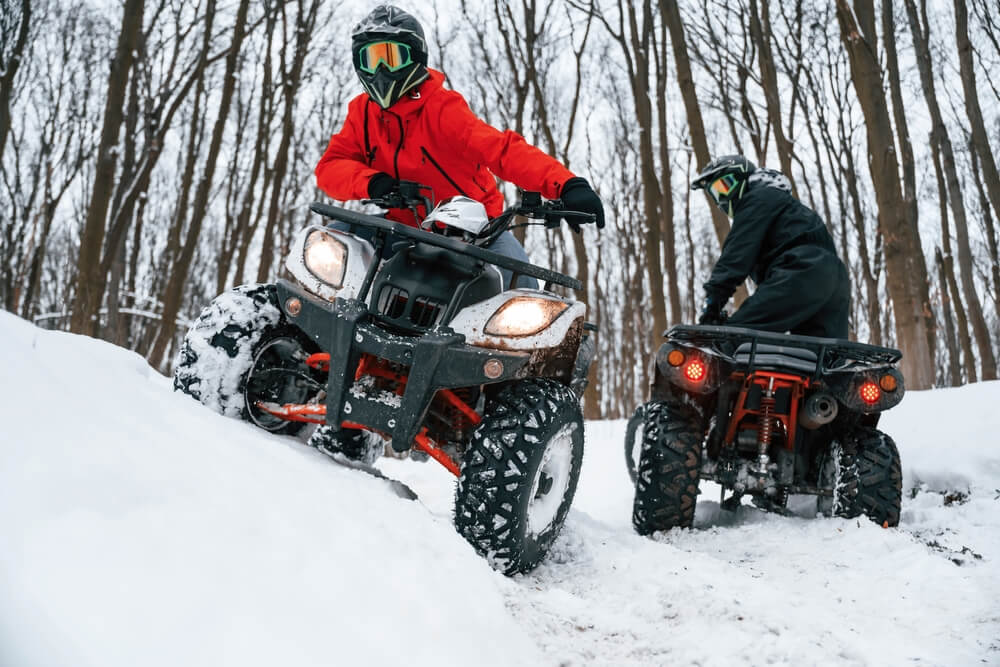
Riding an ATV through British Columbia’s rugged terrain is exciting, but don’t forget about safety. The British Columbia Coroners Service reports that 127 people died in ATV crashes across the province in a recent 10-year period. Proper ATV safety gear is a crucial tool for preventing injuries. The right gear can help minimize the risk of severe injuries in the event of an accident.
Why Safety Gear Matters on ATVs and ORVs in British Columbia
Riding an ATV or ORV without proper safety gear increases your risk of serious harm in an accident. Unlike drivers of cars or trucks, ATV riders have no steel frame or seatbelts to protect them in an accident. This leaves riders and passengers exposed to direct impact in a collision or rollover, increasing the likelihood of catastrophic injuries.
Essential ATV Safety Gear Checklist
Make sure you have this ATV protective equipment before you ride:
- Helmet: British Columbia law requires operators and passengers to wear a certified helmet when riding on Crown land and prescribed private land. Research shows that head injuries are one of the most common types of injuries from ATV accidents and are often fatal.
- Goggles or face shield: Keep your vision clear and protect your eyes from dust, mud, and flying debris by wearing goggles or using a face shield.
- Gloves: Wear durable gloves that improve your grip on the handlebars and protect your hands from cuts and abrasions.
- Boots: Use sturdy, over-the-ankle boots to shield your feet and ankles from injury. Boots also provide traction and ankle support to keep you stable while you ride.
- Protective clothing: Wear long sleeves and long pants made from sturdy fabric to protect yourself against scrapes, burns, and harsh weather.
- Chest protector or body armor: Body protection and chest armor add an extra layer of padding to your chest, back, and shoulders in case of a crash or rollover. Injuries to the torso and abdomen are also common injuries in ATV crashes.
- Reflective or bright gear: Wearing reflective gear and bright clothing makes it easier for others to see you on trails and road crossings, especially in low-light conditions.
What To Do if You Are in an ATV Accident
ATV accidents can happen despite riders’ best efforts. Call 911 and seek medical treatment immediately if you suffer injuries in a crash. Once your condition stabilizes, take the following steps to protect your health and legal rights:
- Follow your doctor’s instructions: Stick to your treatment plan and attend all follow-up appointments.
- Track your recovery: Keep a journal of your symptoms, limitations, and how the injuries affect your daily life.
- Save documentation: Keep your medical records, bills, repair invoices, and any correspondence related to the accident.
- Avoid discussing the accident with others: Do not post details about the collision or your injuries on social media.
- Consult an experienced ATV accident lawyer: A skilled lawyer can explain the province’s ATV laws and the personal injury statutes that apply to your case.
Why You Need a Lawyer With ATV Accident Experience in Vancouver
ATV accident cases in British Columbia often involve complex laws and insurance claim issues. A lawyer experienced in ATV accidents in Vancouver understands how these claims work and knows what evidence can strengthen your case. With knowledgeable legal help, you can focus on your recovery while your lawyer fights for the full and fair compensation you deserve.
Contact Our Vancouver ATV Accident Lawyers for Legal Support
Warnett Hallen LLP is an award-winning Vancouver personal injury law firm with decades of experience handling ORV and ATV accident claims. With a strong track record of successfully advocating for our clients, we are committed to seeking justice for those injured in off-road vehicle accidents. Call now or complete our contact form for a free consultation with an experienced ATV accident lawyer.

